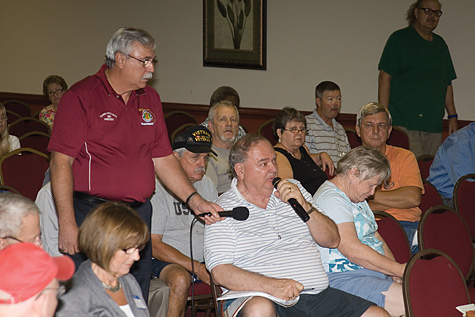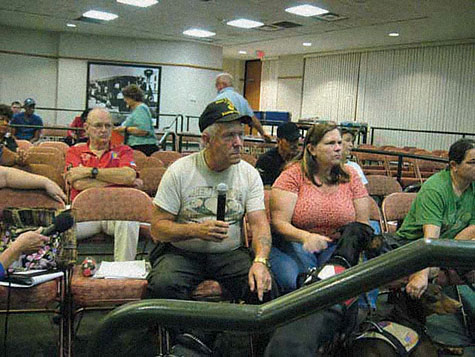 |
|||||||||||
|
November/December 2012 Florida’s Agent Orange Rock Star Tour
BY DALE SPRUSANSKY Upon leaving a February 2012 town hall meeting in Port Charlotte, Florida, about the adverse health effects of Agent Orange on Vietnam veterans and their descendants, Florida VVA State Council Treasurer Tom Hall felt better informed about the issue. He also felt a call to action. Aware that the meeting—one of a series VVA’s Faces of Agent Orange campaign holds across the country—was attended by only a small number of Vietnam veterans in his large state, Hall immediately began devising a plan to bring similar town hall sessions to cities throughout the Sunshine State. He presented his idea to Florida State Council President Ben Humphries. Upon gaining his enthusiastic support and approval, Hall issued a challenge to the state’s chapters to become involved with the Faces of Agent Orange campaign. They, too, expressed interest in Hall’s idea and began to work closely with him and the Florida State Council to bring town hall meetings to their communities. Many local chapters appointed liaisons to work with Hall to organize the meetings. Together, they arranged to fly in VVA Director of Communications Mokie Porter and AVVA President Nancy Switzer to participate in Agent Orange meetings. Marc McCabe, the Regional Chief Service Officer at the St. Petersburg VA Regional Office in southwest Florida, also agreed to participate. To offset the travel and lodging costs of the panelists, the chapters made $500 donations. Hall estimates that it took five months to plan the five town hall meetings across the state. During that time, Hall and the chapter liaisons worked together to find venues, arrange dates and times, and advertise the meetings. In September, highly productive and well-attended town halls took place in Tampa (sponsored by Chapter 787), Jacksonville (co-sponsored by Chapters 1046 and 1059), Vero Beach (sponsored by Chapter 1038), Palm Beach Gardens (sponsored by Chapter 25), and the Brighton Seminole Indian Reservation near Lake Okeechobee in the northern part of South Florida (sponsored by the Florida State Council). At the town halls, the speakers explained to veterans the multitude of physical ailments caused by exposure to AO and emphasized the importance of filing claims with the VA. “We found vets who had never filed an original claim,” McCabe said. In his remarks, McCabe reminded veterans that “the VA is not going to come tell you what your benefits are.” This, he said, is the job of groups such as VVA, and also is why town hall meetings are critically important. The main focus of the meetings, however, was to educate veterans and their families about the intergenerational impact of Agent Orange. Although many veterans are aware that AO has had an adverse impact on their health, a sizable number do not realize the effects on their children and grandchildren. Les Bertrand of Duval County, Florida, Chapter 1046, who helped organize the meeting in Jacksonville, estimated that half of those attending did not know that AO-related conditions can be passed down to future generations. “I didn’t realize this until I started reading the information,” he said. Switzer said that this revelation shook up many veterans in attendance. “Now they’ve got the fire in their belly because this is about their family and their kids,” she said. “It’s been a long time since we’ve had a topic to excite the grassroots,” Hall added. Hall said that veterans exposed to Agent Orange were told to make sure their families fully understand the consequences of that exposure. “They have a moral obligation to open up and talk to their families about being in Vietnam and Agent Orange,” he said.
In an effort to facilitate intrafamily dialogue, the town hall organizers encouraged those in attendance to share their families’ Agent Orange stories. Switzer, whose son suffers from an AO-related heart deformity, and McCabe, whose Vietnam veteran brother has a child born with deformities, were among the first to share their personal stories. Switzer believes that by discussing generational AO ailments among themselves, veterans will feel more comfortable discussing the matter openly. Even though the VA does not acknowledge that many next-generation medical conditions are AO related, McCabe encouraged those in attendance to file claims anyway. Doing so, Switzer said, will force the VA to recognize that it is no coincidence that a high percentage of rare medical conditions are found in the descendants of Vietnam veterans. Switzer also reminded her audiences that if the VA does one day recognize an ailment as being service related, filers will receive benefits retroactive to the date that they originally submitted their claims. Based on the number of claims filed in the weeks following the meetings, many veterans took the advice of the panelists. McCabe said he normally handles around ninety claims a month. “We’re on pace to triple that this month,” he said in early October. Hall believes that his state’s initiative can be replicated in other states and regions. “I recommend that each regional director appoint a Faces of Agent Orange regional coordinator” to organize events such as the one he helped organize. “That way,” Hall said, “we’ll have a network of people who work as a core and plan these meetings.” For those looking to plan a series of town halls, Hall emphasized that partnership and cooperation between the state council and local chapters is critical. “Without the local chapters’ help, the meetings wouldn’t have been a success,” he said. He also stressed that those involved in the planning must “take ownership” of the process. Hall cited “advertising and getting everything coordinated” as the biggest challenges he faced. As a local organizer, Les Bertrand of Chapter 1046 said that his main responsibilities were to provide refreshments for the meeting, find a place for the panelists to stay in Jacksonville, and publicize the meeting locally. Fliers were put in all VA offices and at VFW and American Legion halls in order to promote the event. Additionally, he noted that a billboard highway sign and word of mouth also were used to spread the word. For the Palm Beach County meeting, Hall said that local chapter members appeared on radio and took out an ad in the local newspaper to promote their meeting. The town halls were held at a variety of venues, including community colleges, administrative buildings, and community centers. Switzer said that the car rides between cities were a great opportunity for the panelists to reflect on the meetings by reviewing the questions that were asked and strategizing how to improve future town halls. Hall said that the trips were also a good opportunity for the panelists to bond. Somewhere on the road, he said that the group playfully dubbed themselves the “Florida Agent Orange Rock Star Tour.” Hearing countless stories of suffering took an emotional toll on Tom Hall. “It would tear my heart out,” he said, “how these people had to deal with problems with their children and their grandchildren. It makes you want to just sit there and cry.” Hall is looking into organizing another series of town halls across the state. “I’m going to see if I can get another five cities together,” he said.
For additional information on organizing Faces of Agent Orange town hall meetings, contact Tom Hall at MARINEDI@aol.com Mokie Porter at mporter@vva.org or Nancy Switzer at switzer3@frontiernet.net See also Fred Elliott’s Vice President’s Report in this issue.
|
|||||||||||
| |
|||||||||||
|
|||||||||||
8719 Colesville Road, Suite 100, Silver Spring. MD 20910 | www.vva.org | contact us |
|||||||||||











